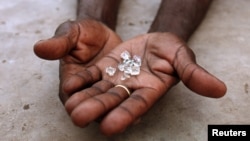HARARE — In Zimbabwe, Western diplomats have finished a tour of the controversial Marange diamond fields, arranged by Zimbabwe's unity government. Officials hoped the tour would alleviate concerns that security forces are abusing miners and stealing revenues, and would help persuade Western countries to lift travel and financial sanctions against President Robert Mugabe and allies with his ZANU-PF party.
The three-day tour by 11 western ambassadors that ended Thursday was at the invitation of Zimbabwean officials to this once no-go area. Besides visiting the fields, the ambassadors toured places where villagers displaced by the mining operations were located by the government.
In an interview after the tour, the European Union Ambassador to Zimbabwe, Aldo Dell'Arricia, said there were still more questions to be answered regarding diamond mining in Zimbabwe.
"Transparency is extremely important in… all extracting mining activities, essentially in order to ensure that the benefits of this wealth trickle down to the population... There [at Marange diamond fields] we have an impression that there is a deficit that transparency is not yet there. We encourage the government of Zimbabwe to continue respecting the principles of the Kimberley Process," Dell'Arricia noted.
The Kimberley Process is the international watchdog system designed to prevent trade in so-called blood diamonds.
Zimbabwe's government wanted Western diplomats to visit the diamond fields to convince them that alleged abuses in the fields have stopped.
In 2009, rights groups accused Zimbabwe's army of seizing the fields by beating, torturing and killing independent miners. Afterward, Kimberley Process members banned Zimbabwe from selling Marange diamonds abroad, a ban that lasted for more than a year.
Many hoped the lifting of the ban would help improve Zimbabwe's economy and increase revenue for the country's cash-strapped government. But that has not been the case.
Finance Minister Tendai Biti has said diamond revenue is still not reaching state coffers, an indication of corruption. He is not alone about expressing concern.
"I think every Zimbabwean would want to see diamonds in Marange benefiting the country," said Shamiso Mtisi, the local Civil Society Coalition coordinator for the Kimberley Process. "For us it is an issue of concern… It is best [for] Zimbabwe to know the actual totality of revenue realized from the diamonds… Once we aware of that information we will be [able to] say how is that money being distributed in electricity, water, social sectors that are lacking."
Beginning in 2002, the United States, Britain and other countries imposed sanctions on people and companies they deemed to be helping Mugabe and his party oppress political opponents and suppress human rights.
After the tour, those sanctions appear destined to stay in place. On Friday, the EU's Dell'Arricia said the West would not use the trip to the controversial diamond fields to review the sanctions.
The three-day tour by 11 western ambassadors that ended Thursday was at the invitation of Zimbabwean officials to this once no-go area. Besides visiting the fields, the ambassadors toured places where villagers displaced by the mining operations were located by the government.
In an interview after the tour, the European Union Ambassador to Zimbabwe, Aldo Dell'Arricia, said there were still more questions to be answered regarding diamond mining in Zimbabwe.
"Transparency is extremely important in… all extracting mining activities, essentially in order to ensure that the benefits of this wealth trickle down to the population... There [at Marange diamond fields] we have an impression that there is a deficit that transparency is not yet there. We encourage the government of Zimbabwe to continue respecting the principles of the Kimberley Process," Dell'Arricia noted.
The Kimberley Process is the international watchdog system designed to prevent trade in so-called blood diamonds.
Zimbabwe's government wanted Western diplomats to visit the diamond fields to convince them that alleged abuses in the fields have stopped.
In 2009, rights groups accused Zimbabwe's army of seizing the fields by beating, torturing and killing independent miners. Afterward, Kimberley Process members banned Zimbabwe from selling Marange diamonds abroad, a ban that lasted for more than a year.
Many hoped the lifting of the ban would help improve Zimbabwe's economy and increase revenue for the country's cash-strapped government. But that has not been the case.
Finance Minister Tendai Biti has said diamond revenue is still not reaching state coffers, an indication of corruption. He is not alone about expressing concern.
"I think every Zimbabwean would want to see diamonds in Marange benefiting the country," said Shamiso Mtisi, the local Civil Society Coalition coordinator for the Kimberley Process. "For us it is an issue of concern… It is best [for] Zimbabwe to know the actual totality of revenue realized from the diamonds… Once we aware of that information we will be [able to] say how is that money being distributed in electricity, water, social sectors that are lacking."
Beginning in 2002, the United States, Britain and other countries imposed sanctions on people and companies they deemed to be helping Mugabe and his party oppress political opponents and suppress human rights.
After the tour, those sanctions appear destined to stay in place. On Friday, the EU's Dell'Arricia said the West would not use the trip to the controversial diamond fields to review the sanctions.




